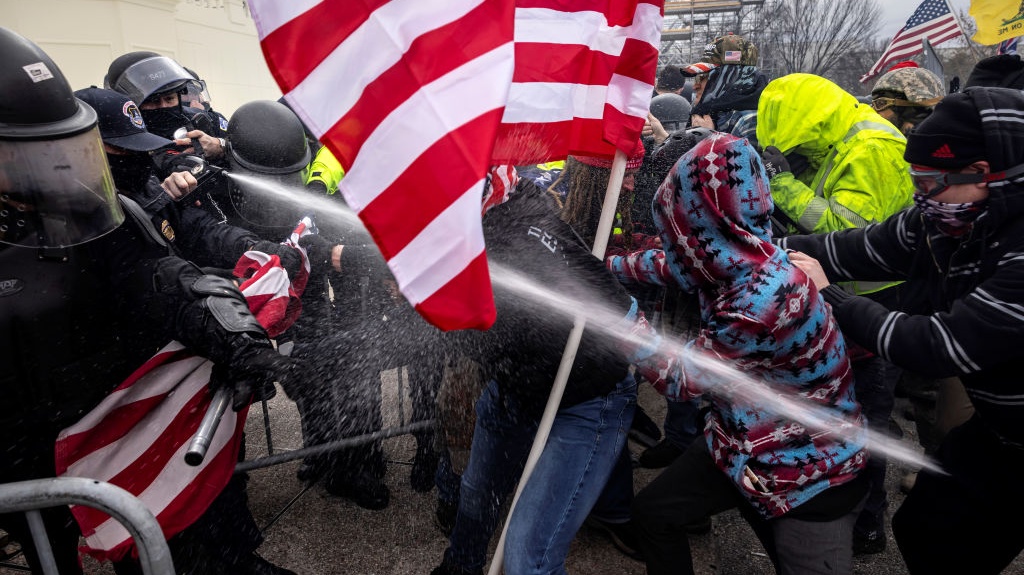If you’re interested in sharing your opinion on any cultural, political or personal topic, create an account here and check out our how-to post to learn more.
____
One year after the violent assault of the capitol, America is still dealing with the aftershocks of the attempt to steal an election. I still remember the disbelief and eventual relief I felt in seeing the attempted coup fail. Unfortunately, there is still a disturbing lack of urgency in recognizing the depth of our crisis. There has been a false sense of security that the danger to our democracy is over. But the fact is that American democracy is still very much under threat, and there is a possibility that we are only a few election cycles from losing our democracy.
The think tank International IDEA, in its report on the global state of democracy, identifies the U.S. as part of the growing trend of backsliding democracies. The report identified one area of particular concern was a decline in effective parliament. Gridlock in Congress contributes to the sense that government cannot deliver on its most basic tasks. It causes apathy because voters do not see their representatives actually delivering on the issues that matter to them.
To be sure, this crisis of democracy has been a long time coming. It is the culmination of a decades-long effort to ensure minority rule through GOP voter suppression. As more and more marginalized groups gained the right to vote, there was a more significant effort to restrict political participation and limit whose votes are counted. In its 2013 Shelby v. Holder decision, the Supreme court gutted the Voting Rights Act. Chief Justice John Roberts glibly pointed to the election of the first Black president as proof that safeguarding voting rights was no longer needed. The decision should have been a wake-up call that democratic gains were being eroded.
What would America look like without democracy? This thought experiment presents few good options. A likely possibility is an electoral autocracy under a strongman dictator. Countries with this style of government go through all the motions of a democratic process. Political parties exist and elections are held, but citizens can't influence the government, and political leaders are not accountable to the people. Minorities and marginalized groups are often ignored or outright persecuted. Russia, for example, has all the trappings of a democracy, yet no one doubts that Vladimir Putin rules the country with an iron fist. While our current democratic processes have not always delivered, it would be a mistake to assume that turning towards a more autocratic approach is the answer.
Democratic erosion is not irreversible, and it requires recognizing that we have the power to effect change. We are not simply bystanders and have the power to influence the government. Politicians and the media might make it seem like our voices don't matter, but collectively we know that is not true. That collective action meant that we ousted a would-be dictator.
We can start to rebuild our democracy by acknowledging the depth of the crisis. Carrying on with business as usual is not an option. We need to reject the “bothsidesing” that pretends the democrats are just as bad as the republicans. We need to clearly and unequivocally call out the republican party for its anti-democratic agenda: the gerrymandered electoral districts, the suppression of votes, the sabotaging of elections and, as we saw last year, the unwillingness to accept the results of free and fair elections and push of the Big Lie. We no longer live in a two-party country. We have one party that is committed to destroying democracy and one that is interested in governing. We need to react to their actions accordingly.
Next, we need to massively improve civic education on the government. The need for better education on the government and its functions can be seen from the Annenberg Policy Center study, which found that one in four Americans could not name the three branches of government. It is not surprising that voters might feel disaffected by a government they don't understand. Civic education fosters democratic values and ensures citizens feel ownership in their community and government.
Civic engagement alone won't do the job. Holding on to our democracy also means showing up and participating — voting every four years and tuning out until the next election is not enough. It means voting in the local and state elections that affect how state officials run elections. If we only show up for Presidential elections and check out again, is it a surprise that politicians don't pursue the issues they campaigned on?
The attacks on the capitol last year were an unmissable wake-up call. The U.S. is following a worldwide trend towards democratic backsliding, and it's naive to assume that American exceptionalism can save us. A liberal democracy is not a fixed constant. No country is inherently democratic; it is an ideal that we are constantly working towards — imperfect as the current conditions may be.
We don't have to sleepwalk into an autocratic takeover. We know the costs of resistance will only increase as more democratic norms and safeguards are eroded. Black and brown communities, especially, are most likely to bear the brunt of increased repression. There is still time to reverse some of the damage done, but it requires us to acknowledge the crisis and work hard to maintain our democracy.
